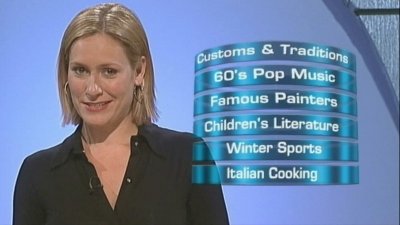Judgemental
Contents |
Host
Sophie Raworth (2002)
Nick Knowles (2003)
Broadcast
Tiger Aspect Productions and Mast Media for BBC One, 2 September 2002 to 31 May 2004 (60 episodes in 2 series)
Synopsis
Three contestants must prove not only their general knowledge, but also their judgement of others', in order to win up to £2000. As well as the main contestants, four more players compete in the game. Dubbed "The Workforce", it is these people who will be judged by the contestants. The incentive for them to do well is that the one who performs best (as judged by something or someone unspecified) gets to come back on the following show as a proper contestant. Fantastically, members of The Workforce are known only by their occupation (a la The Vault's brokers).
In the first round, each member of The Workforce is challenged to answer four general knowledge questions in under one minute. The contestants score by predicting how quickly they can do it, having only their occupation and appearance to draw on for help. After all four have answered, the player with the worst cumulative estimate is eliminated.
Round two sees the contestants' own knowledge put to the test for the first time. Six categories are revealed. The first contestant to play chooses a category, and their opponent chooses a member of The Workforce for them to play against. The contestant and the chosen Workforcer face off with 45 seconds of questions on that subject, on the buzzer. The contestant scores a point for every correct answer; their opponent simply increases their chances of returning the next time. Each contestant plays this round twice. It is not required that every member of the Workforce be involved in this round.
The winner of round two goes on to the final. They may arrange the workforce into any order they choose, and then must play against them one by one, answering 4 questions against the first, three against the second, down to just one question against the last. The contestant has 90 seconds to do all this in. Beating the first opponent is worth £250, then £500, £1000, and £2000 for the last. The contestant can elect to stop and take the money won already at any point between opponents if they don't think they have enough time to beat them, as failure to beat an opponent moves them down one prize level (so a contestant running out of time on the last opponent wins only £500).
All in all, it's a nice little daytime show, ably hosted by newsreader Sophie Raworth, though perhaps nothing to get over-excited about.
But then!
Tinkering
For the second series, a number of alterations were made, each one (in this reviewer's humble opinion) making the show incrementally worse. First and foremost, host Sophie Raworth has departed following her meteoric rise from BBC Breakfast presenter to presenter of the news twelve hours later. Her replacement, consumer affairs guru Nick Knowles, is good, but perhaps just not as good.
The Workforce are now merely referred to by their first names, and are simply referred to as "the panel" which, whatever way you look at it, just doesn't deserve capitalisation.
The main change to the game mechanics comes in the opening round. Under the new regime, the round begins with each contestant choosing a panellist to help them. Then, with sixty seconds on the clock, the contestant's chosen panellist must answer three questions as quickly as possible. The contestant can then use any remaining time to answer questions themselves for points. After each contestant has played, the one with the lowest score is eliminated. This might seem like an altogether fairer game for the contestants, and perhaps it is, but it comes with an associated downside. Observant readers might have noticed that the opening round was the only one in which every member of The Workforce was guaranteed a go. The new rules raise the startling possibility that a panellist might go the whole show without ever being asked a question.
Round two has been changed so that, on their first go, players can choose their own opponent. Alright, but why? What was wrong with the old way? It just feels like change for change's sake.
So, there we have it. The tragic tale of a moderately good show, made slightly worse. Almost Shakespearean, isn't it?
Inventor
Mark Baker and Steve Havers for Mast Media.
Trivia
Sophie Raworth's main run of 30 editions completed on 11 October 2002. No episode was scheduled on 11 September, and the episode on 24 September was pulled for news coverage of a dossier about Iraq. As Judgemental rolls from day to day, the remaining episodes were postponed by a day. The final two shows were transmitted on 20 December 2002 and 17 August 2003.
Nick Knowles took over from 1 September 2003 for a 30 episode run until 10 October. No episode was scheduled on 5 September and we also think that two episodes were pulled due to news coverage. The three final shows went out on the next spring Bank Holiday Mondays - 12 April, 3 May, and 31 May 2004.


